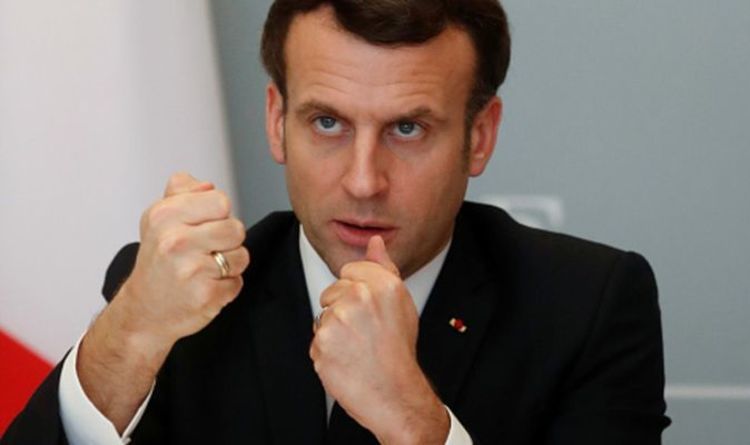Macron looking for ‘handy enemy’ says commentator
We use your sign-up to provide content in ways you’ve consented to and to improve our understanding of you. This may include adverts from us and 3rd parties based on our understanding. You can unsubscribe at any time. More info
The two leaders will be meeting in the Italian capital ahead of the G20 on Friday. Joe Biden and Emmanuel Macron have not seen each other since the Americans snatched a lucrative submarine deal with Australia from the French, in the so-called AUKUS defence pact which also involved Britain.
The partnership torpedoed a mega-contract for French submarines with the Australians.
Since then, Washington has been trying to smooth things over.
President Biden and President Macron have already spoken twice on the phone since the crisis broke.
In addition, US Vice President Kamala Harris will visit Paris in November.
France is seeking, in particular, to obtain the blessing of the Americans to the creation of a true European defence, a project dear to the French, but which has still not really taken shape, 30 years after its launch.

French Armed Forces Minister Florence Parly told her NATO counterparts last week not to fear the European Union’s defence plans, saying that the United States will benefit and any European capabilities will strengthen the alliance.
The remarks, made at a NATO defence ministers meeting and shared with reporters, sought to end months of uncertainty about whether the latest EU effort to develop weapons and forces would be in competition with the alliance.
“When I hear some defensive statements on European defence and when I observe certain threats, including within this organisation, I say: ‘don’t be afraid!’,” Ms Parly told a session that included the EU’s top diplomat Josep Borrell.
“European defence isn’t being built in opposition to NATO, quite the contrary: a stronger Europe will contribute to a strengthened and more resilient alliance,” Ms Parly said.
READ MORE: Why Germany is deafeningly silent on Europe’s nuclear energy summit
US Secretary of Defence Lloyd Austin responded positively in his public remarks, saying he welcomed a more capable European defence, echoing a joint statement in September issued by the French and US presidents.
“What we’d like to see are initiatives that are complementary to the types of things that NATO is doing,” Mr Austin told a news conference.
He urged NATO allies to live up to their “number one job” of “credible deterrence and defence”.
Austin also suggested there were no contradictions between a European and an American strategy in the Indo-Pacific, saying that NATO allies were working together to counter China’s military rise.
DON’T MISS:
Brexit LIVE: Macron runs to EU as French plot new Jersey fishing war [LIVE BLOG]
Brexit: ‘F***ing fishing!’ Furious Elton John LOSES IT with Boris [VIDEO]
Poland could unravel EU’s legal authority – what it means for Brexit [ANALYSIS]

He pledged to “collectively work to ensure that the Indo-Pacific area region remains free and open.”
While European countries have highly-trained soldiers and modern cyber, naval and air power, any EU combat mission would likely lack the kind of support that the United States provides, such as long-range air transport, command and control capabilities, logistics support and intelligence.
The UK also says the EU can play a supporting role to NATO. But Defence Secretary Ben Wallace on Thursday described any attempt to build a European army as a distraction, telling reporters it was a “red herring” and that there was “absolutely no point in sticking European berets on a whole load of people”.
f the 27 EU states, 21 are also members of the 30-strong NATO, but the United States has long argued that the bloc should be able to do more to manage the crises on its borders.
In March next year, the EU aims to agree a master military strategy document to define future threats, while focusing on developing weapons together, as well as outlining a new EU intervention force that could intervene in crises.
Eastern European states fearful of Russia are very wary of any shift in focus away from NATO. NATO Secretary-General Jens Stoltenberg warned against duplication. “What is needed are more capabilities, not new structures,” he told a news conference.
Additional reporting by Maria Ortega
Source: Read Full Article





